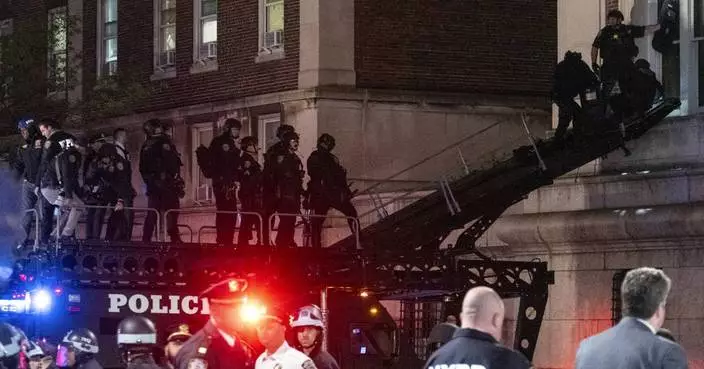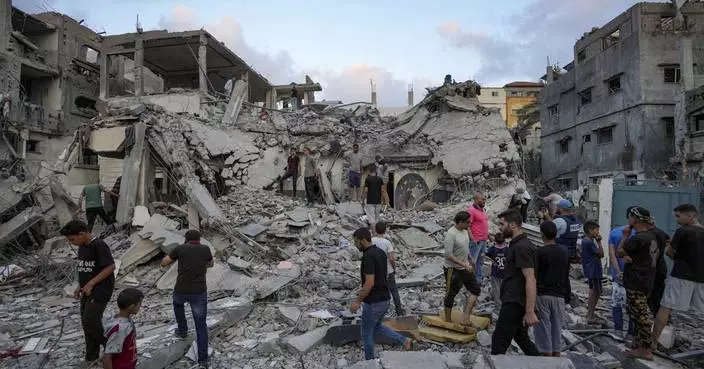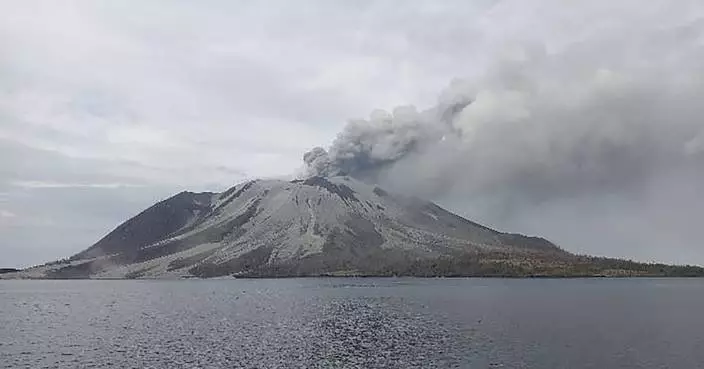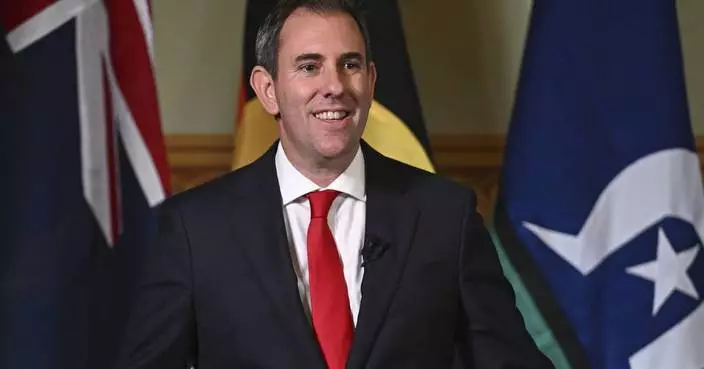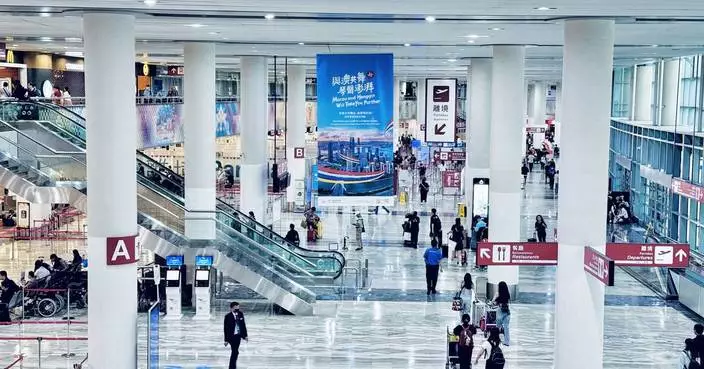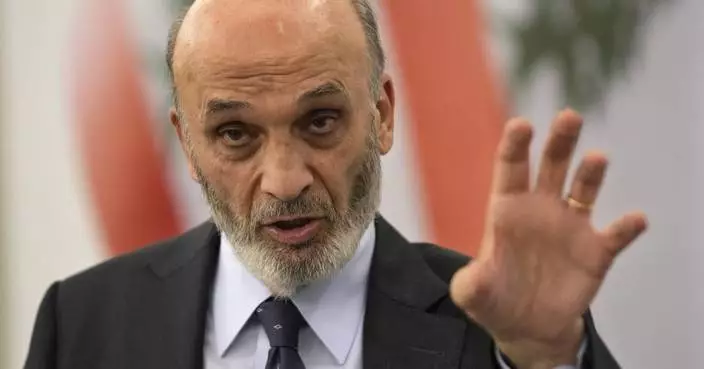Hawks, vultures and storks circle overhead as Christopher Sveen points at the heap of refuse rotting in the desert heat. "This is the mine of the future," he beams.
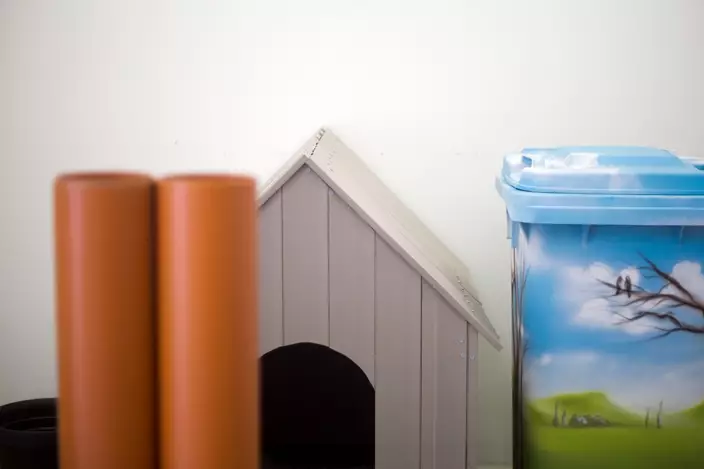
In this Tuesday, March 13, 2018 photo, plastic products made from garbage are on display at the UBQ factory in Kibbutz Zeelim. (AP Photo/Ariel Schalit)
Sveen is chief sustainability officer at UBQ, an Israeli company that has patented a process to convert household trash, diverting waste from landfills into reusable bio-based plastic.
Click to Gallery
Hawks, vultures and storks circle overhead as Christopher Sveen points at the heap of refuse rotting in the desert heat. "This is the mine of the future," he beams.
Sveen is chief sustainability officer at UBQ, an Israeli company that has patented a process to convert household trash, diverting waste from landfills into reusable bio-based plastic.
"We take something that is not only not useful, but that creates a lot of damage to our planet, and we're able to turn it into the things we use every day," said Albert Douer, UBQ's executive chairman. He said UBQ's material can be used as a substitute for conventional petrochemical plastics and wood, reducing oil consumption and deforestation.
The small plant can process one ton of municipal waste per hour, a relatively small amount that would not meet the needs of even a midsize city. But UBQ says that given the modularity, it can be quickly expanded.
The steely gray powder then enters a reaction chamber, where it is broken down and reconstituted as a bio-based plastic-like composite material. UBQ says its closely-guarded patented process produces no greenhouse gas emissions or residual waste byproducts, and uses little energy and no water.
UBQ says its material can be used as an additive to conventional plastics. It says 10-15 percent is enough to make a plastic carbon-neutral by offsetting the generation of methane and carbon dioxide in landfills. It can be molded into bricks, beams, planters, cans, and construction materials. Unlike most plastics, UBQ says its material doesn't degrade when it's recycled.
After five years of development, the company is bringing its operations online, with hopes of revolutionizing waste management and being a driver to make landfills obsolete. It remains to be seen, however, if the technology really works and is commercially viable.
UBQ operates a pilot plant and research facility on the edge of southern Israel's Negev Desert, where it has developed its production line.
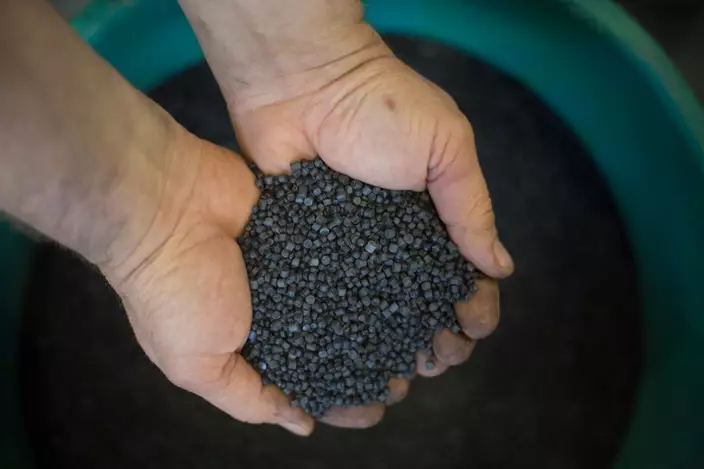
In this Tuesday, March 13, 2018 photo, a worker holds bio-based thermoplastic composite made from substantially unsorted municipal solid waste material in the UBQ factory in Kibbutz Zeelim.(AP Photo/Ariel Schalit)
"We take something that is not only not useful, but that creates a lot of damage to our planet, and we're able to turn it into the things we use every day," said Albert Douer, UBQ's executive chairman. He said UBQ's material can be used as a substitute for conventional petrochemical plastics and wood, reducing oil consumption and deforestation.
UBQ has raised $30 million from private investors, including Douer, who is also chief executive of Ajover Darnel Group, an international plastics conglomerate.
Leading experts and scientists serve on its advisory board, including Nobel Prize chemist Roger Kornberg, Hebrew University biochemist Oded Shoseyov, author and entrepreneur John Elkington and Connie Hedegaard, a former European Commissioner for Climate Action.
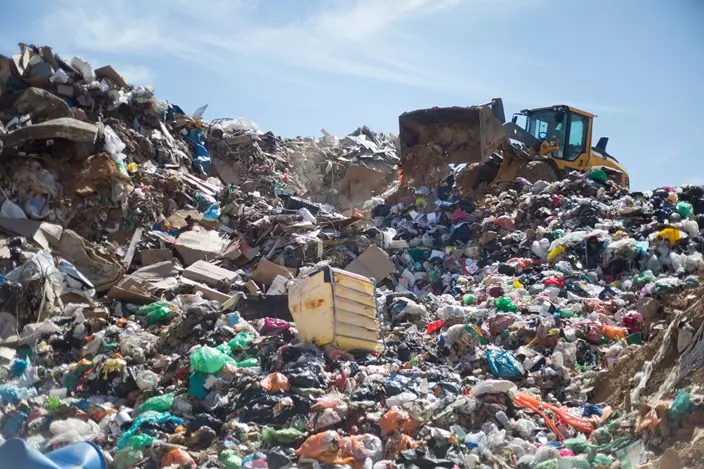
In this Tuesday, March 13, 2018 photo, a tractor works in a landfilled near the UBQ factory in Kibbutz Zeelim. (AP Photo/Ariel Schalit)
The small plant can process one ton of municipal waste per hour, a relatively small amount that would not meet the needs of even a midsize city. But UBQ says that given the modularity, it can be quickly expanded.
On a recent day, UBQ Chief Executive Tato Bigio stood alongside bales of sorted trash hauled in from a local landfill.
He said recyclable items like glass, metals and minerals are extracted and sent for further recycling, while the remaining garbage — "banana peels, the chicken bones and the hamburger, the dirty plastics, the dirty cartons, the dirty papers" — is dried and milled into a powder.

In this Tuesday, March 13, 2018 photo, Jack Tato Bigio co-Founder and Chief Executive at UBQ, holds a recycled plastic bucket next to a pile of dried and shredded garbage at the UBQ factory in Kibbutz Zeelim. (AP Photo/Ariel Schalit)
The steely gray powder then enters a reaction chamber, where it is broken down and reconstituted as a bio-based plastic-like composite material. UBQ says its closely-guarded patented process produces no greenhouse gas emissions or residual waste byproducts, and uses little energy and no water.
According to the United Nations Environment Program, 5 percent of global greenhouse gas emissions are produced by decomposing organic material in landfills. Roughly half is methane, which over two decades is 86 times as potent for global warming as carbon dioxide, according to the U.N. Intergovernmental Panel on Climate Change.
For every ton of material produced, UBQ says it prevents between three and 30 tons of CO2 from being created by keeping waste out of landfills and decomposing.
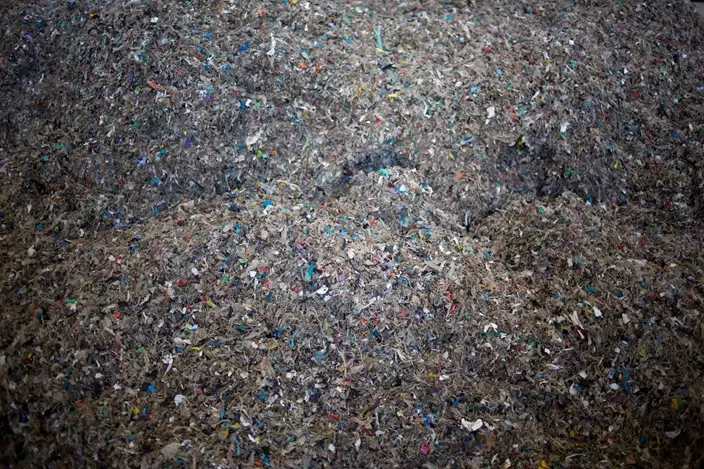
In this Tuesday, March 13, 2018 photo, dried and shredded garbage is piled in the UBQ factory in Kibbutz Zeelim.(AP Photo/Ariel Schalit)
UBQ says its material can be used as an additive to conventional plastics. It says 10-15 percent is enough to make a plastic carbon-neutral by offsetting the generation of methane and carbon dioxide in landfills. It can be molded into bricks, beams, planters, cans, and construction materials. Unlike most plastics, UBQ says its material doesn't degrade when it's recycled.
The company says converting waste into marketable products is profitable, and likely to succeed in the long run without government subsidies.
"What we do is we try to position ourselves at the end of the value chain, or at the end of the waste management hierarchy," Sveen said. "So rather than that waste going to a landfill or being incinerated, that's kind of our waste feedstock."
The wonder plastic isn't without its skeptics, however. Duane Priddy, chief executive of the Plastic Expert Group, said UBQ's claims were "too good to be true" and likened it to alchemy.
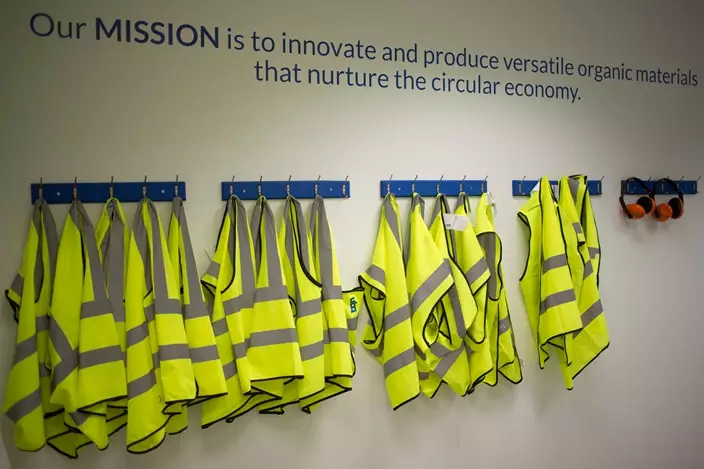
In this Tuesday, March 13, 2018 photo, safety jackets hang at the UBQ factory in Kibbutz Zeelim. (AP Photo/Ariel Schalit)
"Chemists have been trying to convert lead to gold for centuries, without success," Priddy, a former principal scientist at Dow Chemical, said in an email to The Associated Press. "Likewise, chemists have been trying to convert garbage to plastic for several decades."
UBQ said it is confident its technology will prove the skeptics wrong. "We understand that's people's perceptions. We hope to convince them in a professional and scientific manner," Sveen said.
Even if its technology is ultimately successful, UBQ faces questions about its long-term viability. Building additional plants could be expensive and time-consuming. It also needs to prove there is a market for its plastic products. The company said it is negotiating deals with major customers, but declined to identify them or say when the contracts would go into effect.
The U.N. Environment Program has made solid waste disposal a central issue to combatting pollution worldwide. Landfills contaminate air, water and soil, and take up limited land and resources. A December 2017 report by the international body devoted five of its 50 anti-pollution measures to reducing and processing solid waste.
"Every year, an estimated 11.2 billion tons of solid waste are collected worldwide," the organization says. "The solution, in the first place, is the minimization of waste. Where waste cannot be avoided, recovery of materials and energy from waste as well as remanufacturing and recycling waste into usable products should be the second option."
Israel lags behind other developed countries in waste disposal. The country of roughly 8 million people generated 5.3 million metric tons of garbage in 2016, according to the Environment Ministry. Over 80 percent of that trash ended up in increasingly crowded landfills. A third of Israel's landfill garbage is food scraps, which decompose and produce greenhouse gases like methane and carbon dioxide.
To UBQ, that means a nearly limitless supply of raw material.
"The fact is that the majority of waste goes to a landfill or is leaked into our natural environments because there simply aren't holistic and economically viable technologies out there," said Sveen.
Police were removing an encampment of pro-Palestinian protesters at the University of Wisconsin’s Madison campus and have taken away several protesters.
Several police officers arrived at the encampment on the campus’ Library Mall around 7 a.m. Wednesday and played a recorded message on a loop saying it was a final warning and that protesters were in violation of university code, WISC-TV reported.
About 20 minutes later, nearly 60 police officers, some with riot shields, arrived and began removing tents and other items, the station reported.
Video from WISC-TV showed police with riot shields pushing against protesters and the protesters pushing back while chanting slogans, including “Free Free Palestine.” The station said that at least 10 protesters were taken away by police with their hands zip-tied by officers.
Police later removed some tents that had remained at the encampment, but about 30 protesters surrounded another tent to prevent officers from reaching it.
Campus leaders and police warned students last week to comply with state law and university rules, which prohibit unauthorized camping on campus. But on Monday, several hundred protesters gathered on the Mall, located between Memorial Library and the Wisconsin Historical Society, and established an encampment, the Wisconsin State Journal reported.
Currently:
— Police clear pro-Palestinian protesters from Columbia University while clashes break out at UCLA
— Student protesters reach a deal with Northwestern University that sparks criticism from all sides
— Trump’s comparison of student protests to Jan. 6 is part of effort to downplay Capitol attack
Here's the latest:
New York City Mayor Eric Adams said in an appearance on on “CBS Mornings” on Wednesday that police had identified organizations and individuals who weren’t university students, but professional agitators.
“Once I became aware of the outside agitators who were part of this operation, as Columbia mentioned in their letter and their request with the New York City Police Department, it was clear we had to take appropriate actions when our intelligence division identified those who were professionals, well trained,” Adams said.
Adams and the NYPD made similar claims before the arrests that the protest had been co-opted by outside agitators, though did not provide specific evidence to back up that contention. While people involved in the Columbia demonstrations acknowledge that some people not part of the college community have participated, they forcefully dispute the idea that outsiders were driving or unduly influencing the protests.
Adams pointed to protesters breaking into Hamilton Hall at Columbia University, saying some of the tactics and methods have been used across the globe.
“And we understood how really dangerous this situation had become,” Adams said, noting they made sure that a minimum amount of force was used to “eradicate the problem” at City University of New York and Columbia.
When there’s an analysis of those arrested, Adams said a substantial number of them won’t be City University of New York or Columbia students.
Adams said he understands the power of protests, but they have to make sure they don’t turn violent. Breaking into Hamilton Hall was not protesting, “that was committing a crime,” he said.
New York City Mayor Eric Adams said on MSNBC’s “Morning Joe” on Wednesday that police had to move in to Columbia University’s Hamilton Hall “for the safety of those children.”
He blamed outside agitators for the building takeover.
“There are people who are harmful and they’re trying to radicalize our children and we cannot ignore this,” Adams said.
The NYPD’s deputy commissioner for public information, Tarik Sheppard, who appeared with the mayor, held up a heavy chain.
“This is not what students bring to school,” Sheppard said. “This is what we encountered on every door inside Hamilton Hall.”
Sheppard said 40 to 50 people were arrested at Hamilton Hall with no injuries. Adams said they will face charges including burglary, trespassing and criminal mischief, while those who were arrested outside the building will be face less serious charges.
Six people have been arrested and suspensions have been issued to seven students who participated in demonstrations at Tulane University, the school in New Orleans said in a message to the university community early Wednesday. One more suspension was pending, officials said.
The university was also looking into reports of university employees participating in the demonstration.
“We value free speech and have supported numerous lawful demonstrations throughout this year,” the university said in the statement. “But we remain opposed to trespassing, hate speech, antisemitism and bias against religious or ethnic groups.”
Four buildings on campus would remain closed Wednesday as the demonstration continued, with classes scheduled in those buildings going remote, officials said.
When several dozen protesters camped in about a dozen small tents on a grassy area near an administration building Monday, police “moved in immediately to attempt to stop the encampment,” the administration said Tuesday. There were arrests and students were suspended after a confrontation with police Monday and the Students for a Democratic Society organization also was suspended, the university said.
Dueling groups of protesters clashed Wednesday at the University of California, Los Angeles, grappling in fistfights and shoving, kicking and using sticks to beat one another.
Hours earlier, police carrying riot shields burst into a building at Columbia University that pro-Palestinian protesters took over and broke up a demonstration that had paralyzed the school while inspiring others.
After a couple of hours of scuffles between pro-Palestinian and pro-Israeli demonstrators at UCLA, police wearing helmets and face shields formed lines and slowly separated the groups. That appeared to quell the violence.
Police have swept through campuses across the U.S. over the last two weeks in response to protests calling on universities to stop doing business with Israel or companies that support the war in Gaza. There have been confrontations and more than 1,000 arrests. In rarer instances, university officials and protest leaders struck agreements to restrict the disruption to campus life and upcoming commencement ceremonies.

Demonstrators clash at a pro-Palestinian encampment at UCLA early Wednesday, May 1, 2024, in Los Angeles. Dueling groups of protesters have clashed at the University of California, Los Angeles, grappling in fistfights and shoving, kicking and using sticks to beat one another. (AP Photo/Ethan Swope)

A person looks out as demonstrators clash at a pro-Palestinian encampment at UCLA early Wednesday, May 1, 2024, in Los Angeles. Dueling groups of protesters have clashed at the University of California, Los Angeles, grappling in fistfights and shoving, kicking and using sticks to beat one another. (AP Photo/Ethan Swope)

Demonstrators clash at a pro-Palestinian encampment at UCLA early Wednesday, May 1, 2024, in Los Angeles. Dueling groups of protesters have clashed at the University of California, Los Angeles, grappling in fistfights and shoving, kicking and using sticks to beat one another. (AP Photo/Ethan Swope)
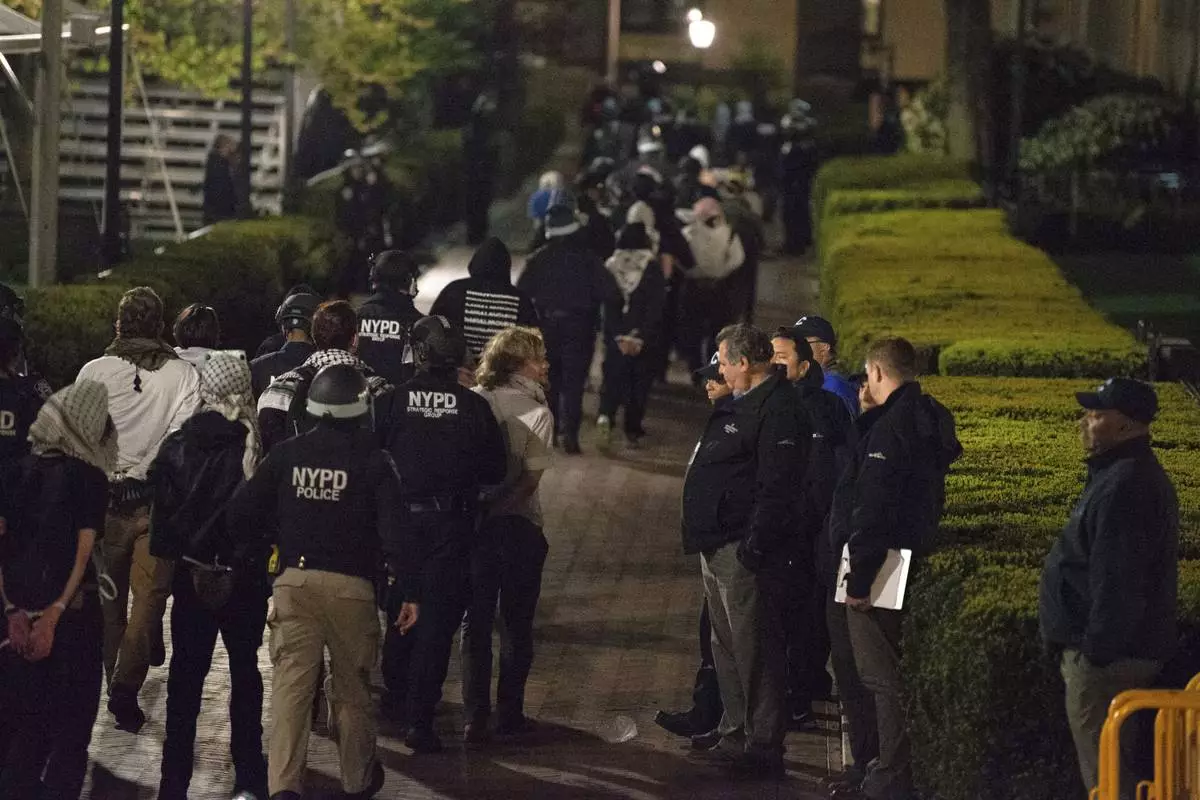
Officers with the New York Police Department arrest pro-Palestinian protesters at Columbia University, Tuesday, April 30, 2024, in New York. The protesters had seized the administration building, known as Hamilton Hall, more than 20 hours earlier in a major escalation as demonstrations against the Israel-Hamas war spread on college campuses nationwide. (Marco Postigo Storel via AP)

Officers with the New York Police Department arrest Pro-Palestinian protesters at Columbia University, Tuesday, April 30, 2024, in New York. The protesters had seized the administration building, known as Hamilton Hall, more than 20 hours earlier in a major escalation as demonstrations against the Israel-Hamas war spread on college campuses nationwide. (Marco Postigo Storel via AP)

Officers with the New York Police Department raid the encampment by pro-Palestinian protesters at Columbia University on Tuesday, April 30, 2024, in New York. The protesters had seized the administration building, known as Hamilton Hall, more than 20 hours earlier in a major escalation as demonstrations against the Israel-Hamas war spread on college campuses nationwide. (Marco Postigo Storel via AP)

Officers with the New York Police Department raid the encampment by pro-Palestinian protesters at Columbia University, Tuesday, April 30, 2024, in New York. The protesters had seized the administration building, known as Hamilton Hall, more than 20 hours earlier in a major escalation as demonstrations against the Israel-Hamas war spread on college campuses nationwide. (Marco Postigo Storel via AP)

Pro-Palestianian protesters gather near a main gate at Columbia University in New York, Tuesday, April 30, 2024, just before New York City police officers cleared the area after a building was taken over by protesters earlier in the day. The building and a tent encampment were cleared during the operation. (AP Photo/Craig Ruttle)

















